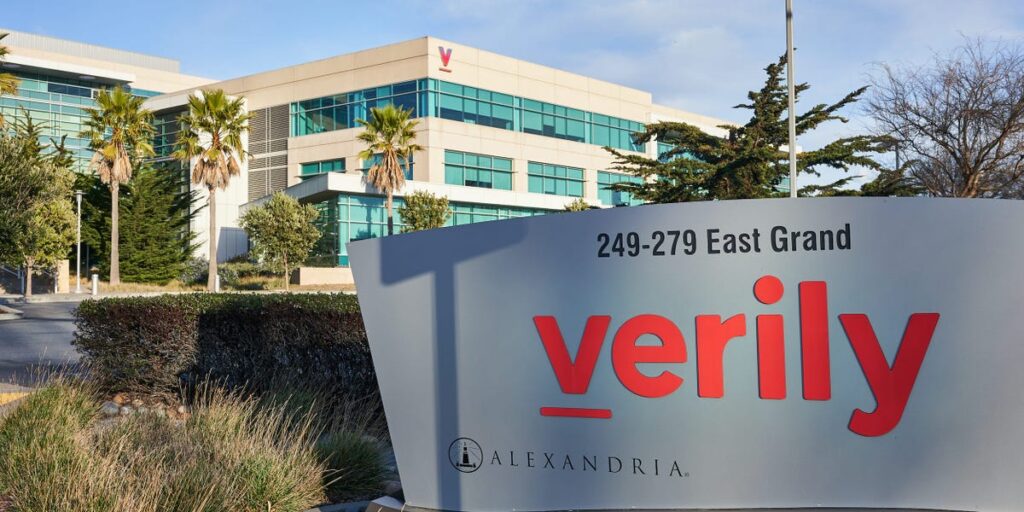- Verily, Alphabet’s life sciences group, is preparing to detach from Google.
- Verily has told employees it ultimately intends to become an independent company.
- Staff were recently told about “an essential stepping stone” to leaving Alphabet.
Verily, Alphabet’s life sciences subsidiary, has set a deadline of December 16 to sever multiple ties to Google, according to two people familiar with the matter and internal documents reviewed by Business Insider.
The company has been working to remove itself from the tech and services it shares with Google, such as its cloud infrastructure and employee benefits. While Verily will still be part of the Alphabet holding company after the December deadline, Verily leaders have told employees the separation efforts are crucial to eventually becoming a fully independent company.
Verily, formerly known as Google Life Sciences, started life as a moonshot project inside Google X. It now offers health-related technology services and products, including retinal scanning, clinical trial management, and Lightpath, an AI-powered platform for chronic care.
“In order to one day become an independent company, Verily must first separate from Google’s infrastructure and systems and stand up and operate its own,” explained one of the documents reviewed by BI.
Verily’s effort to separate itself from Google is being driven by its secret Flywheel project, which Business Insider first reported on in 2021.
“Project Flywheel is the effort that allows us to do this – and is therefore an essential stepping stone on this journey and path to independence,” one of the recent internal documents explained.
Lately, Verily employees have been issued new laptops, new office badges, and new email addresses that are no longer aliases of the Google email domain, according to one of the people familiar with the matter. The people who spoke to BI asked to not to be identified discussing private matters.
Employees will also lose access to Google’s employee benefits by the end of December and will receive new benefits fully dictated by Verily, according to one of the internal documents.
In the past, Verily leadership has dangled the possibility of spinning off Verily as a public company. One employee told BI that an IPO is still held up “as a carrot” to staff, but it’s possible Verily might pursue a different path outside Alphabet.
“We continue to aspire to be an independent company, but we do not have a set timing for independence at this time,” one of the internal documents reads. A timeline for full separation could not be determined by BI.
“Verily is transitioning from Google’s infrastructure to our own, as we continue to grow as an independent Alphabet company,” said Verily spokesperson Steven Cooper. “This move enables us to advance our technology based on what’s best for Verily and our healthcare and life sciences customers.”
Uneven results
When Google founders Larry Page and Sergey Brin shook up their company’s corporate structure in 2015 and created Alphabet, the goal was to distance some of the more ambitious and costly projects from the main Search business. These projects would benefit from Google’s deep pockets but could be nurtured into fully functioning businesses.
The results have been uneven so far.
Self-driving car division Waymo has gained momentum, but some other projects have been shut down or scaled back amid increased pressure to rein in spending. The moonshot lab, X, has pulled back on graduating new companies into bets, as BI previously reported.
Can Verily stand on its own?
Whether Verily can stand on its own two feet is still a big question among company insiders. Some current and former employees have criticized Verily’s constant pivots between products and pointed to a revolving door of leaders and a mishmash of unrelated projects, which also include a wastewater testing business and a project to reduce mosquito-borne diseases.
One of the documents reviewed by BI noted that Alphabet “will continue to be our largest investor” after the December separation. Verily announced a $1 billion investment round in 2022, which was led by Alphabet. It has raised at least $3.5 billion in total, according to Pitchbook data.
“We are one of the longest running bets, and as such, it makes sense that we are the first Alphabet company to embark on this journey,” reads one internal Verily document.
An internal Verily FAQ for staff broached the subject of why the company didn’t start Flywheel until after its products were more mature.
“Verily’s products are at different development stages ranging from those that already support a growing customer base to those that are in early development,” the FAQ stated. “Since Flywheel is a large and complex multi-year effort, we want to execute on it in parallel to the on-going product development efforts so that both will be ready for separation from Google at around the same time.”
Are you a current or former Verily employee? Got more insight to share? You can reach the reporter Hugh Langley via the encrypted messaging app Signal (+1 628-228-1836) or email (hlangley@businessinsider.com).
Read the full article here


